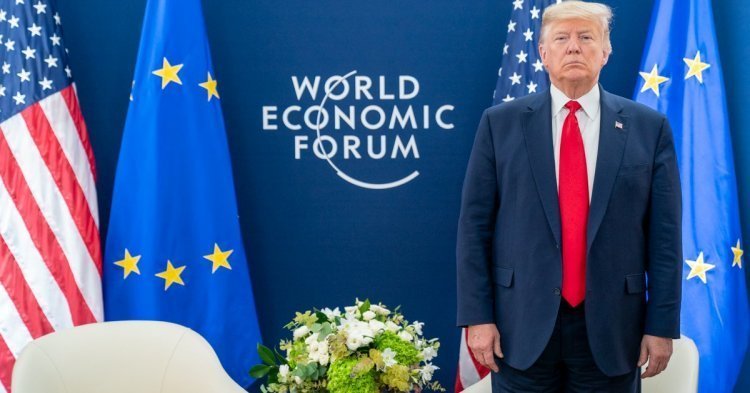Joe Biden has been elected as the new President of the United States. It may come as a surprise to some that the former Senator of Delaware, along with Kamala Harris, convinced American citizens to put an end to the Trump era after only a single term in office. The news was welcomed by most European leaders. Among the first to comment was the President of the European Commission, Ursula von der Leyen, the Chancellor of Germany, Angela Merkel, and the President of France, Emmanuel Macron. Congratulating the president-elect, they immediately pointed out the global battles to be fought “side by side”.
The news was equally welcomed by Paolo Gentiloni, current European Commissioner for Economy who, in a slightly less impartial way, told Twitter that he was “hugging himself” in celebration. David Sassoli, President of the European Parliament, similarly welcomed the results, claiming that the American-European alliance could now be restored.
In the last four years, both Trump’s and the European Union’s foreign policies have almost always clashed due to strong ideological differences. But, although the tycoon’s extreme policies of isolationism and distrust towards international institutions have encouraged Europe’s own sovereignist parties (The League, Brothers of Italy, Alternative for Germany, National Rally, Vox, and Law and Justice to name a few), on the other hand, they have taught the European Union to stand on its own two feet.
The election campaign leading up to Trump’s inauguration focused much more on discrediting the opponent, rather than focusing on the actual policy proposed by candidates, as has often been the case in significant elections over the last twenty years. The Republican further circulated extreme populist ideas, such as building a wall with Mexico, banning Muslims from entering the States, and banning internet access in certain parts of the country.
When Donald Trump took to office in the White House at the start of 2017, there were many questions raised about what his presidency would entail: How would it handle foreign policy? What matters would it grant primary importance? Would it change its relations with allied countries? And what would its relationship be with Russia, China and the Arab countries?
Europe was showing more than just some signs of concern. The financial crisis was still a delicate matter and two new challenges were becoming increasingly alarming: the flow of migrants from North Africa, where the so-called Arab Spring had not given the results hoped for, and the threat of terrorism, which had returned to the old continent through coordinated attacks that had not been seen for over a decade. Europe had been counting on help from across the pond.
In his first days of presidency, Trump immediately made his feelings of distrust towards international communities clear by withdrawing from the Trans-Pacific Partnership, a project aimed at promoting innovation and development in a number of countries in the Asia-Pacific area. The President defended his decision by claiming that he preferred to act though bilateral agreements.
A further breakdown in foreign relations took place at the Taormina G7 Summit in Sicily, in May 2017, which Trump barely took part in. The summit focused on the fight against terrorism, technological innovation, and the climate emergency which had been gaining momentum across Europe, so much so that major events were organized under the name #All4theGreen during that period, anticipating Fridays for Future by more than a year.
On his return to Washington D.C, Trump announced the US’ withdrawal from the Paris Agreement aimed at strengthening the global response to the threat of climate change. The final blow which highlighted the country’s unwillingness to cooperate with the rest of the world came in October 2017, when the Trump administration announced the United States’ withdrawal from UNESCO.
While some disapproved of his policies, many disagreed with the billionaire’s attitude towards politics, arrogant and not at all diplomatic in his approach. During the election campaign for example, when some doubts were raised by the European Union, Trump responded with the threat of starting a new trade war.
Between the White House and Brussels, there was not only a practical incompatibility, but also a “philosophical” one. Obviously, completely breaking down relations with the largest country in the world, as well as the oldest European ally, would have been pure madness, but a rupture between the two was inevitable, causing the unexpected result mentioned above: the strengthening of Europe.
Because of its structure, its history and the plurality of nations it represents, the European Union cannot be defined as a key contender in the ‘Game of Thrones’, in which the United States, China, and Russia have participated for decades. That said, it cannot be denied that in recent years the Union has acted as a strong centre of power, despite being hindered by several factors, including the opposition of some of its own member states (the Visegrád Group first and foremost). Indeed, the launch of PESCO, the Union’s commitment to becoming climate neutral by 2050, and the Digital Europe Programme are by no means minor achievements. But the most striking aspect which underlines how the Union has started to become more independent, is the diplomatic but direct and fearless way in which it currently expresses itself through its institutions. One only has to look at the way Europe has handled confrontation with Trump regarding his threat to impose tariffs on Europe, or how it has collaborated with NATO, constantly defending its values and principles when questioned.
One can also not fail to mention Brussels’ strong response to the pandemic which has been one of commitment and caution since January, when the first European case occurred in France. So far, not a week has gone by without Europe intervening through the provision of resources, support for the various sectors of work, funding research for a vaccine, as well as offering economic and humanitarian aid.
It must be said, however, that solidarity in this context has been global; it is impossible to forget how Cuba, certainly not one of the richest States in the world, was among the first countries to send its doctors overseas to help other healthcare systems. Quite the opposite can be said for the United States, which at first underestimated the virus, calling it a “Chinese problem”, before entering into a state of total chaos. This was certainly not helped by the tricky relationship between President Trump and Anthony Fauci, the immunologist in charge of the US task force dealing with the emergency.
Despite the circulation of superficial as well as completely false information, numerous riots, some inevitable populism, and the rupture with the World Health Organization, fortunately, no other country has followed in the White House’s footsteps. The diktat of the Trump administration has, perhaps, had a bigger impact on the outcome of the elections than expected.
With Joe Biden at the Oval Office desk, it is possible that the United States will resume the path begun by Barack Obama, who was once served by Biden as vice-president, favouring a friendly and stable future relationship with Europe. Thanks to an easier transoceanic collaboration, self-sufficiency and leadership in global challenges will no longer be demanded from Europe. That said, if the Union were to play a leading role in the geopolitical landscape in the future, the courage and responsibility it has shown over the last four years should not be forgotten. The European Union must not forget how Trump has, albeit unintentionally, made us stronger and more independent than ever.



Follow the comments: |
|
